SHE WUZ ROBBED: BTF DELIVERS DNA GOODS WITH WELL-DEVELOPED ‘PHOTOGRAPH 51’ … BROOKSHER BEAMS AS ROOKED SCIENTIST
BY DAN VALENTI
PLANET VALENTI NEWS AND COMMENTARY
PLANET VALENTI ARTS
(FORTRESS OF SOLITUDE, MONDAY JUNE 19, 2023) — Periodically, THE PLANET like to run arts reviews, the justification of which can be found, minimally, in the break it allows us (and we hope our readers) from the gravitational tugs of a fevered world penetrating at least to the ninth circle. It is then, for the way it cleanses the lenses of perception, that we appreciate the variations of play — the arts — that allow both breather and reflection.
———- ooo ———-
PHOTOGRAPH 51, a play by Anna Ziegler, directed by David Auburn, running June 15-July 1, at the Unicorn Theater, Stockbridge, The Berkshire Theater Festival. A Review.
It’s history, fictionalized by a playwright. It’s science, caricatured. It’s social preaching, a woman of achievement patronized by men. It’s a “detective story” involving nothing less than “the secret of life.”
It’s Photograph 51, Anna Ziegler’s winning entry in the 2008 STAGE International Script Competition. The drama tells the story of the crucial (and uncredited) role played by chemist and X-ray crystallographer Rosalind Franklin in the Watson-Crick DNA breakthrough. Franklin’s 51st X-ray photograph became the first to show the actual structure of the genetic life force.
This play is talky. Fortunately, director David Auburn’s production skirts this through judicious minimalism. Bill Clarke’s scenic design (cool blue), Daniel Kotiowitz’s lighting, and Scott Killian’s sound follow the “less is better” pattern. A tile lab floor, emotive light shifts, and woodwinds to cue scene changes combine to keep the emphasis not on the actors as much as the acting, which is, in a word, superb. You won’t see explosions or sword play. You will see something more delicate and piercing: the dysfunction of genius and the emotional toll one must pay for single-minded pursuit.
———- ooo ———-
Photograph 51 lives or dies, of course, on the role of Franklin, a no-nonsense, direct, icy woman excelling in a lab full of men. To call her a bitch is to side with the men. It’s the 1950s, all tweed and wool, and women in laboratories had best blend in quietly with the test tubes, beakers, and microscopes. This isn’t Franklin… but Rebecca Brooksher IS.
Brooksher conveys the cool distance of Rosalind Franklin in curious, probing ways, for instance, when she means business, she can sheer off the end of a sentence, clean. Brooksher’s articulations know when (and when not) to punctuate with hack saws and axes rather than periods and semicolons. Brooksher communicates Franklin’s contradictions through movement, gesture, facial expression and vocal tonality. These elements combine to establish a presence. Call it command. It’s all Brooksher. Her Franklin is a magnet whose poles both attract and repel. Her outfits are conventional (nod to the spot-on costume design of Olivia Bovenzi Blitz), a sardonically buttoned contrast to this determined, singleminded woman.
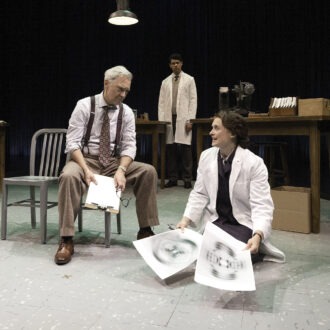
David Adkins, Brandon Dial and Rebecca Brooksher in Photograph 51, 2023. Photo by Emma K. Rothenberg-Ware.
That Franklin is “Cricked” out of Nobel fame and glory for her DNA work by the machinations of James Watson (an “Ugly American” Allen Tedder) and Francis Crick (a crisp Christian Coulson) stems from her pile-driving father, who drilled her that “You must never be wrong.” Does father really know best?
Here’s the rub. As a devalued woman in a 1950s science lab, she does not have the luxury of a mistake, unlike her male colleagues. Brooksher brings the pathos of pent pressure in a woman unable to lance the soul’s festering. Brooksher’s handling eliminates any interpretation of whining over Franklin’s “daddy issues” or her inability to love or feel love — except for her work. She spills that on her science, X-ray diffusion forming her engagement, her wedding the classic diffraction patterns of organized DNA. Chilling.
———- ooo ———-
Franklin’s perfectionism gave Watson and Crick the opening to rush in, steal her work, combine it with their own findings, publish it, and discover that DNA’s structure is a self-replicating, never-ending double helix. It may be a discovery of how the world works, but as Ziegler pens it, not how people work.
Tedder’s Watson calls to mind a crossing of Randy Quaid in the movie Midnight Express and, more currently, Rob Schneider. He’s pushy and loud, broad and goofy with hair venturing into the Larry Fine. Tedder straddles then crosses the thin line separating in-your-face from over-the-top. Yeah, scene chewing. Crick is Watson’s congenial partner, played smartly by Coulson. Crick is an augmenter as delivered by Coulson, brisk and decisive, avoiding unnecessary detail.
The reliable David Atkins brings a dry, brittle reluctance into his role as Maurice Wilkins, who shared the Nobel Prize with Watson and Crick. Atkins too has mastered the hesitation pitch.. Where Brooksher’s Franklin hesitates based on her ill-fated push to throw a perfect game each time out, Wilkins hesitates for different reasons: (a) reluctance to accept that a woman will lead the X-ray portion, (b) a secondary disinclination to accept the Nobel glory he shares, knowing that Franklin is the missing Nobel name), and (c) the reluctance of guilt when he laments never pursuing his amorous feelings for Franklin. Atkins is proficient in character, a man whose education and cultivation subdue rather than free, suitable to sciene but not for love.
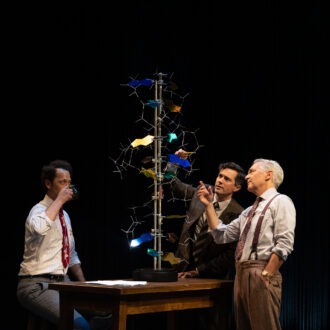
Allen Tedder, Christian Coulson and David Adkins in Photograph 51, 2023. Photo by Emma K. Rothenberg-Ware.
Brandon Dial plays Ray Gosling, Franklin’s wry student assistant, and Shaun Anthony as eager Don Caspar, newly minted Ph.D. who signs on as her awestruck adjutant. They form the chorus, easing the scenic transitions and filling in the cracks with narrative glue.
———- ooo ———-
The flaw in Ziegler’s writing occurs in a coda that comes off as tacked and artificial. Wilkins laments to the ghost of Franklin that he should have told her of his love. Probably best that he didn’t. Franklin could have returned it.
There’s no indication that Franklin’s experience in the King’s College lab ever had a romantic angle. This is pure authorial stretching, coming off as verbose, Ziegler’s apology for not having any boy-meets-girl earlier.
It doesn’t work, and there’s not much director Auburn can do, much less the actors. This love-lost of Wilkins-Franklin is already present between the lines. Auburn didn’t miss it. The actors didn’t miss it. The playwright did. As presented on the night we saw it, the play ran one hour and 50 minutes, about 20 minutes too long.
Nonetheless, this turns out to be a quibble. Photograph 51 earns a PLANET VALENTI Nobel.
Tickets: BerkshireTheaterGroup.org. 413-997-4444.
—————————————————–
“Acting, an activity one performs to keep an audience from coughing” — Sir John Gielgud.
“OPEN THE WINDOW, AUNT MILLIE.”
LOVE TO ALL.
Copyright (c) 2023 By Dan Valenti, PLANET VALENTI and EUROPOLIS MANAGEMENT. All rights reserved. The views and opinions expressed in the comment section or in the text other than those of PLANET VALENTI are not necessarily endorsed by the operators of this website. PLANET VALENTI assumes no responsibility for such views and opinions, and it reserves the right to remove or edit any comment, including but not limited to those that violate the website’s Rules of Conduct and its editorial policies. Those who leave comments own all the responsibilities that are or can be attached to those comments, be they rhetorical, semantic, or legal. Such commentators remain solely responsible for what they post and shall be and remain solely accountable for their words. PLANET VALENTI shall not be held responsible for the consequences that may result from any posted comment or outside opinion or commentary as provided in, but not limited to, Section 230 of the Communications Decency Act and this website’s terms of service. We serve as a marketplace of ideas, without prejudice and available to all. All users of this site — including readers, commentators, contributors, or anyone else — hereby agree to these conditions by virtue of this notice and their use of/participation in this site. When PLANET VALENTI ends with the words “The Usual Disclaimer,” that phrase shall be understood to refer to the full text of this disclaimer.



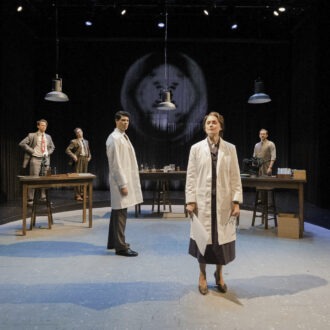
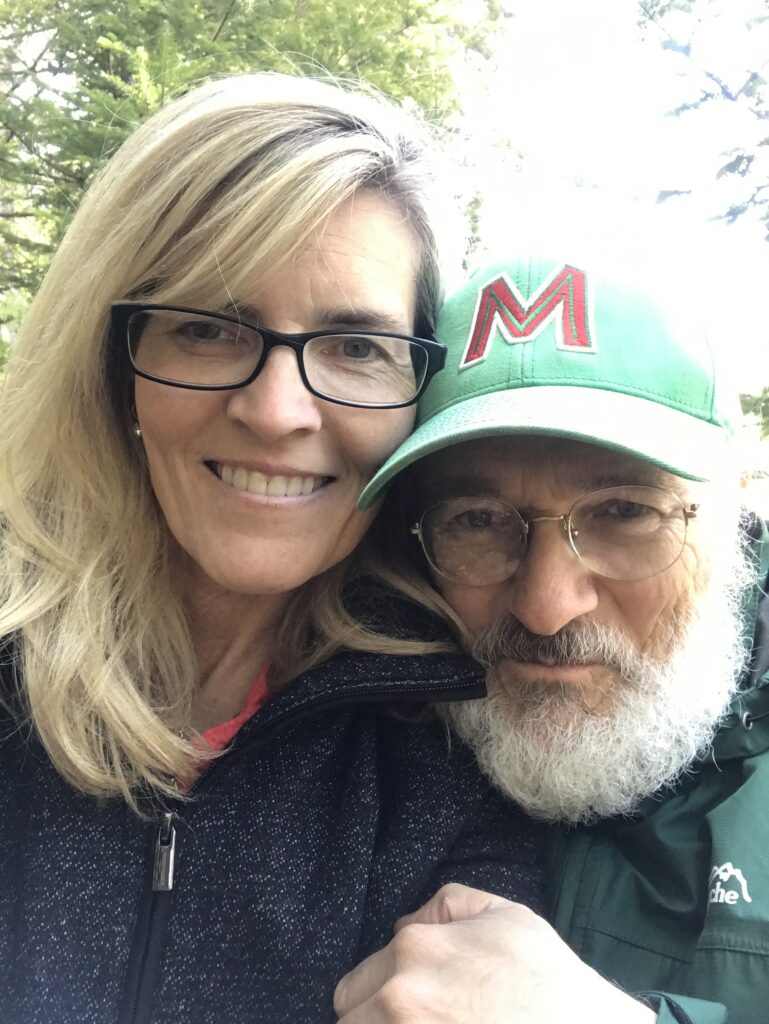
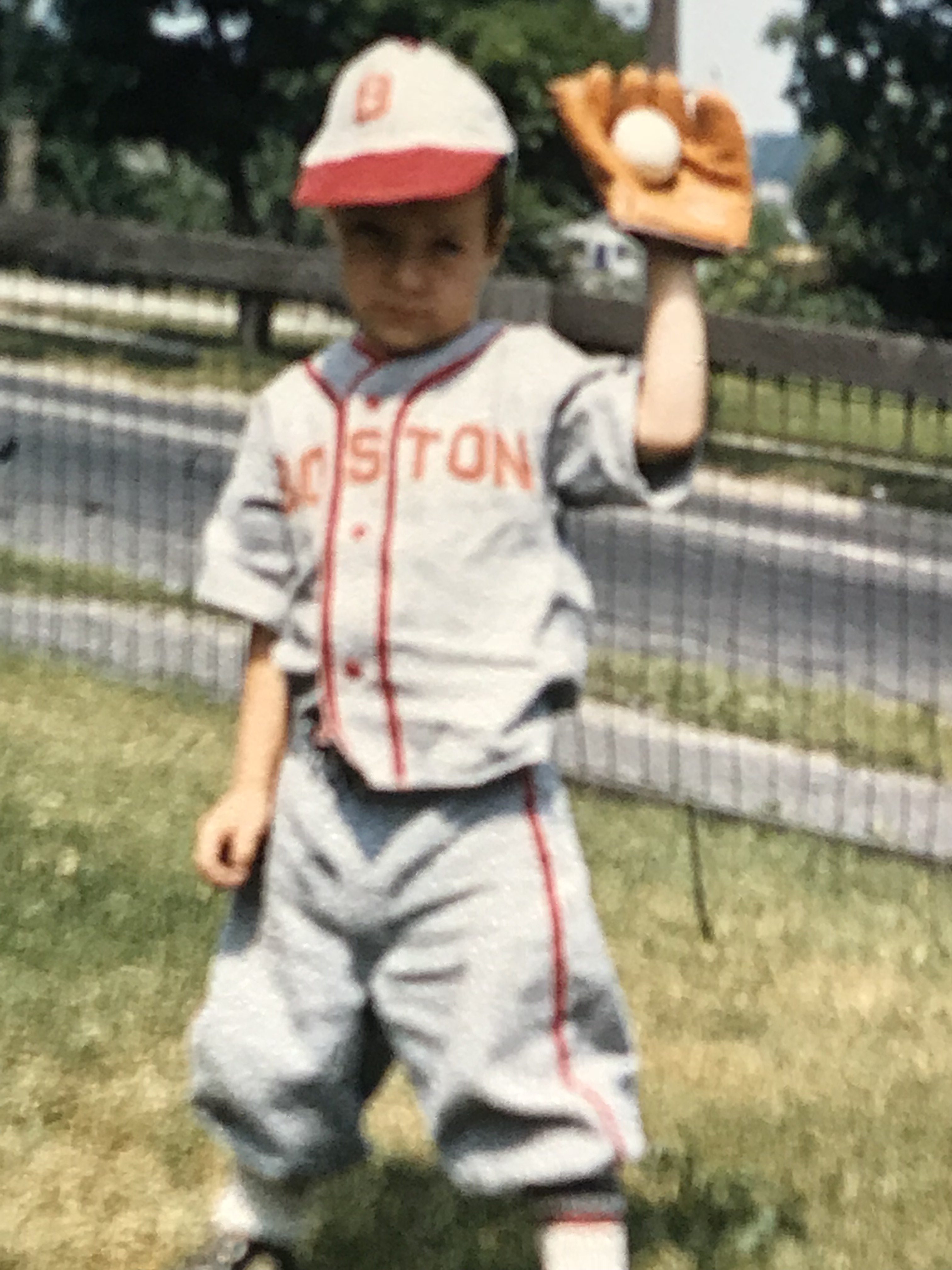
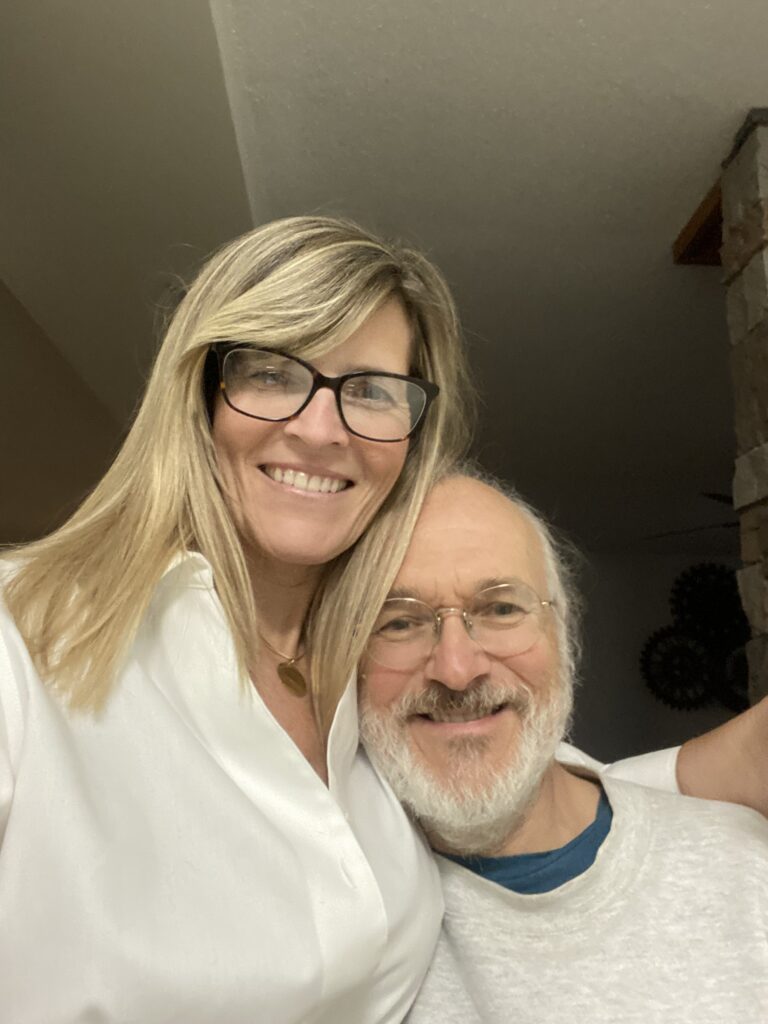

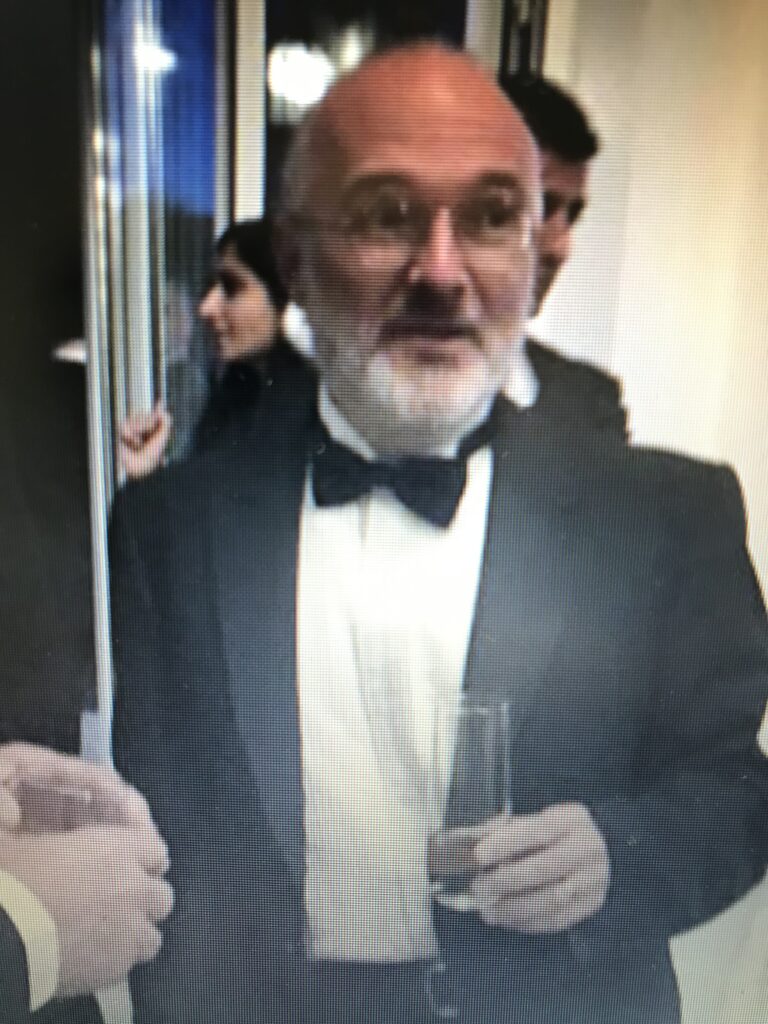


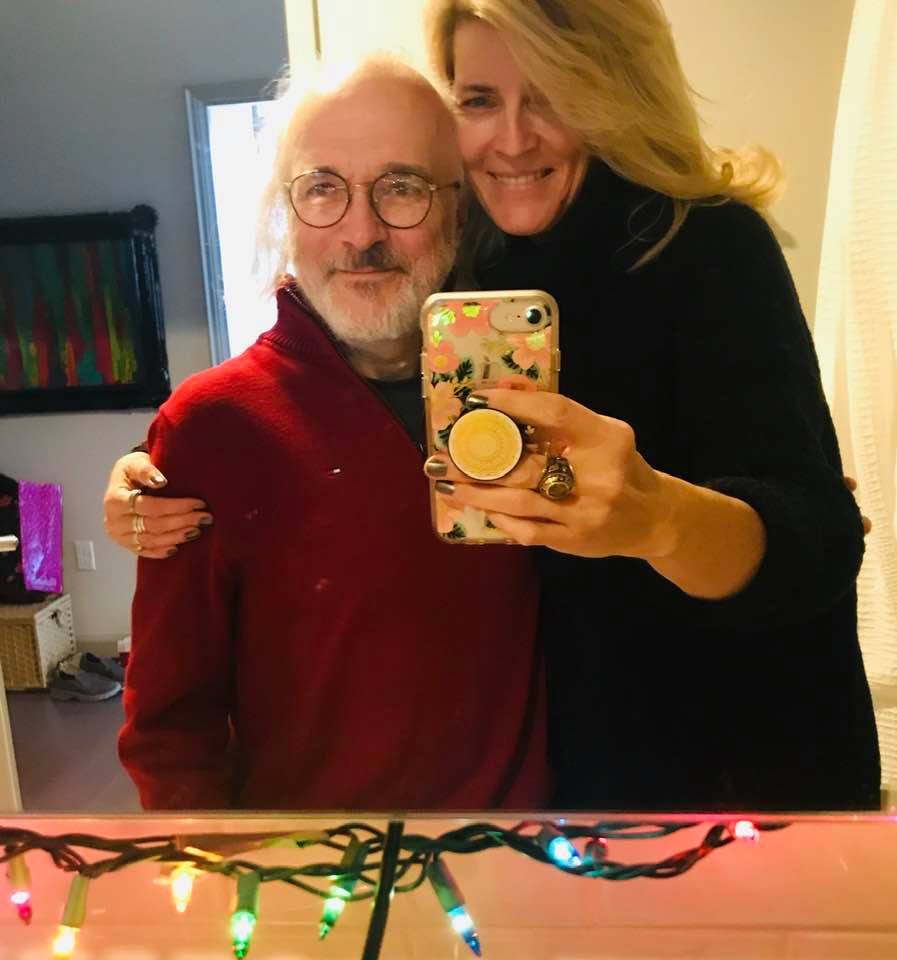
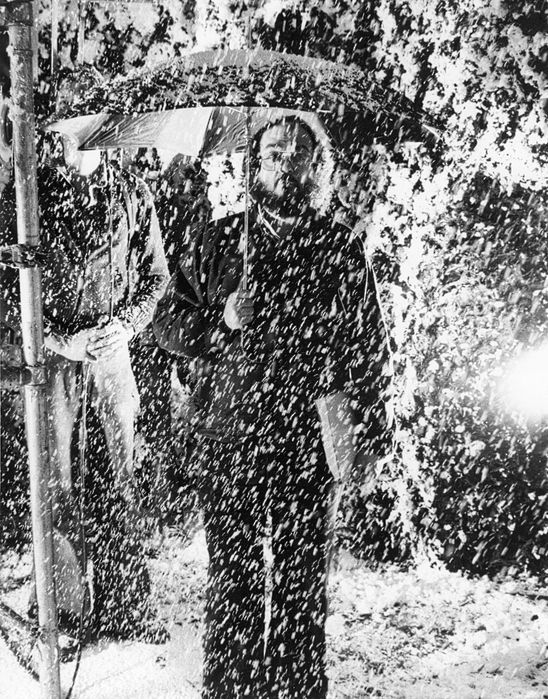

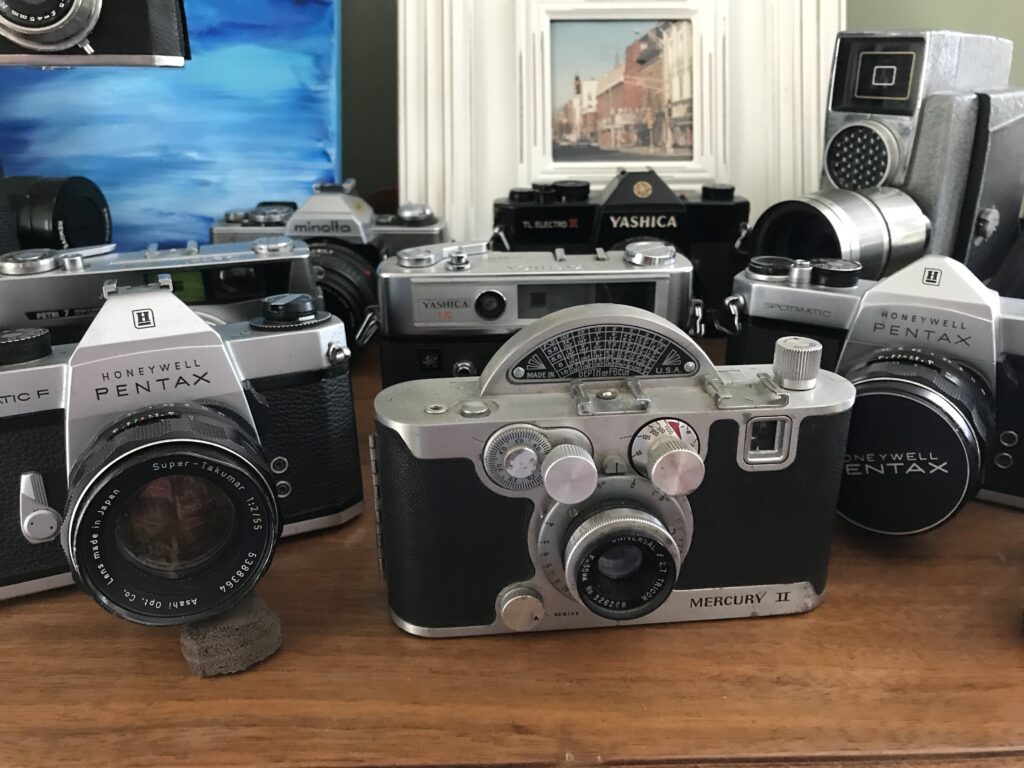

The harrassment of Dr. Franklin and the theft of her research was in fact blatantly document by Dr. Watson in his book, The Double Helix.
Nobel prizes are often awarded to thieves, and when one is awarded to great fanfare, it is reasonable to wonder whether another scientist is left in the dust with an ax to grind.
Every award goes to thieves, usually after an investigation- it’s their way of meeting disclosure mandates without telling the real truth & alarm.
Yes, he documented his version of the “use” of Franklin’s research. He, Crick, and Wilkins were inching toward the double-helix revelation. Franklin’s work provided the piece that enabled them to induce the correct conclusion. Did Franklin realize the full significance of what she had revealed? Did her perfectionism pull the reins on the discovery, preventing her from “getting in first?” Interesting questions. For the play, that would have been a more profitable line for the playwright to explore rather than invent a love interest that wasn’t there. Still, a fine piece of writing masterfully delivered by the players at the Unicorn.
Franklin, err Rutberg, sim = uncanny
Stay-in-place,
Dot, dot, dot ~ reflections, please see the last issue of this year’s Educating our Eagles. Behavioral management in the last few days of schools has a tendency to look somewhat unconventional, but as long as the kids are safe, engaged, and having fun, we’re not writing home.
…not telling parents if your child is having a struggle ??
What are you talking about.
Mr. MILLER, I’m looking for you to write home so that if my child needs support I can make informed choices.
I couldn’t have said this better myself. My sister treated me Friday to this gem, and I have to say that I haven’t seen acting that good, especially between the two characters, Maurice and Rosalind, on stage in a long time. I can’t articulate the way that you do, but I knew I was in for a pleasant experience when the scene between the two professors where Wilkins hands her a box of chocolates and Rosalind asks why he’s giving them to her. He says he wants to start over, and she’s puzzled. He says something about being friends. She says “You want to be my friend?” And he says yes. “Don’t you want to be my friend?” He asks, and she says, quite sternly, “No!” And spins around to continue her work at her desk.
This would puzzle men in that era, because women had been bred to be sweet and accommodating and in the field of science, they don’t belong. It makes the men in this play appear sort of “bafoonish” at times because she is a different breed and they’re trying to solve this mystery that walked into the lab. The ironic thing is that she is very simply there to complete a task. To the men, she’s more complicated than the end goal, which, because of her tenacity and her off putting nature, she does accomplish before getting diagnosed with a life altering illness.
The play was a little longer than it should have been, especially with no break, my eyes were getting heavy. It’s “wordy”, but I did look forward to each scene because I quickly grew to love the characters, even the goofy ones. David Adkins and Rebecca Brooksher were so spot on that I felt as if we were witness to a genuine conversation, complete with believable facial gestures and not something they’ve practiced over and over.
Well, that’s my two cents. Have a great week, Dan.
Thanks, GIRL. These are perceptive remarks. Wanna job as THE PLANET’s arts critic? We’re looking for one.
One pleasure of living in these hills is the culture that surrounds us, from the theater to Tanglewood and everything in between. Everyone should enjoy the summer and attend these wonderful treasures that are rare to find….Happy Summer everyone!
Well said, SHIRL!
Is this a typo from the Eagle?
A new study reveals the overworked and underpayed ‘invisible underclass’ behind Berkshires curtains.
Must be talkin bout the senior citizens on fixed incomes. Prolly take care of that right away.